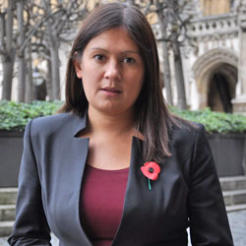Charities must explain their value to the public to counteract increasing criticism from politicians and the media, Lisa Nandy, shadow minister for civil society, told delegates at the Charity Retail Association’s conference yesterday.
Speaking at the closing plenary of the conference at Keele University, the Labour MP for Wigan said charities were "under scrutiny and under fire" from politicians.
She cited the Lobbying Act as an example, as well as the behaviour of politicians, including justice secretary Chris Grayling, who criticised campaigning and charities that challenge government on decisions about vulnerable people.
“There are too many politicians believing that the sector can be used as a political football,” she said. “The row about pay largely ignored the fact that the vast majority of charities are really small and have perhaps one or two paid staff members.
“We’ve seen the Comic Relief Panorama programme threaten to undermine some of the public confidence in charities. Despite that public confidence has held up.
“However, more than ever, all parts of the sector need to be explaining the value they have and not being shy about it or reluctant to champion what you do for local communities.”
'Huge waste of charity shops' potential'
Nandy told delegates that she wanted to celebrate charity shops in the broadest sense of what they do and what they mean for people.
She praised the CRA for commissioning research by Demos, which found no evidence to suggest the growth of charity shops is causing or facilitating the decline of UK high streets.
The report found high streets would be worse off if it were not for charity shops and outlined the benefits of charity retail, including its positive impact on the environment through recycling, and their social value in providing volunteering and employment opportunities.
Nandy said the report was “enormously useful” in providing evidence that charity shops are not putting independent retailers at risk.
She also said Labour had no plans to changes the system of rate relief that charity shops receive.
Nandy said she has been travelling the country meeting with charities and charity shops.
She said she had heard there can be a disconnect between a charity’s core mission and the work of charity shops in communities, which was a “huge waste of potential”.
“I’ve seen what happens when charity shops and core missions are allowed to coincide,” she said, describing a membership scheme that provided essential products for refugee families supported by the Children’s Society, run through one of the charity’s shops.
'Spread myself like a rash'
Nandy, who worked for the Children’s Society and Centrepoint before being elected as an MP in 2010, said her role as shadow minister for civil society was an “unusual job”.
“Someone told me recently ‘your job is to spread yourself like a rash over shadow government’. It’s not the most pleasant analogy but everything affects the sector and I have to make sure I build strong relationships with colleagues and get into every part of shadow government to make sure the sector works its way into conversations,” she said.
Nandy said Labour leader Ed Miliband’s stated mission to “push power outwards and downwards” puts the voluntary sector in a critical role.
When David Cameron launched the Big Society, she said, as a charity worker, she had felt a sense of hope that communities would have more power and civil society would play a greater role.
“That’s a vision I share, but it is difficult to feel that sense of hope now in places like Wigan,” she said. “You cannot ignore the inequalities. Some families, individuals and communities are under far greater strain than others.
“David Cameron’s Big Society is about the state as a hindrance to civil society not a partner with it. If the state steps out of the way society will flourish. That puts civil society and government against each other, but that is surely the wrong way to look at each other.
“They are not in competition, they are fundamentally different. It is when we work together is when we transform people’s lives for the better.”









